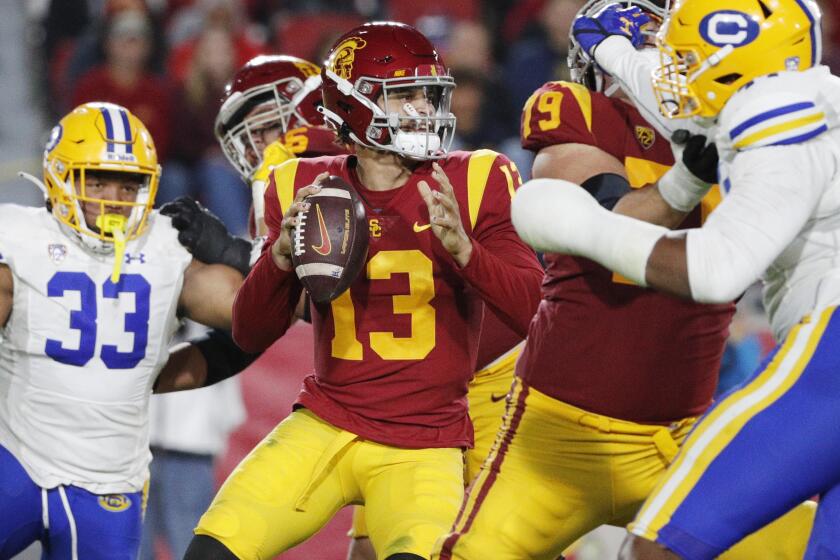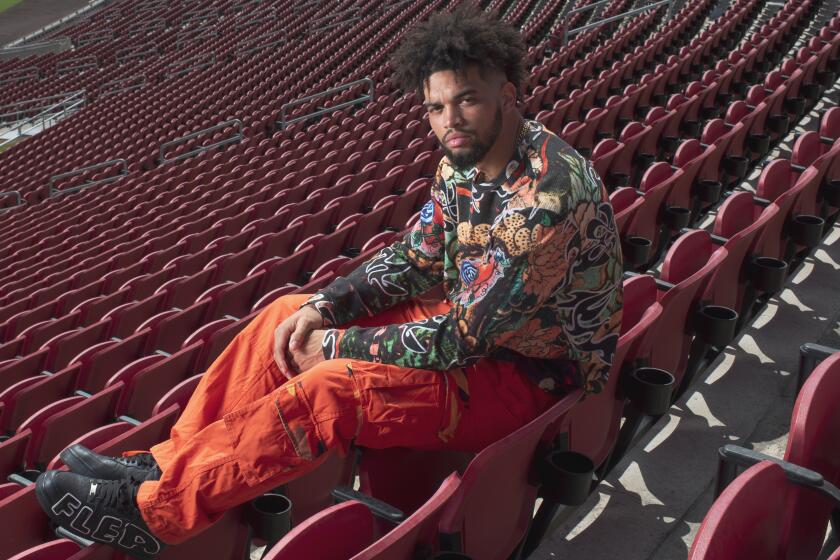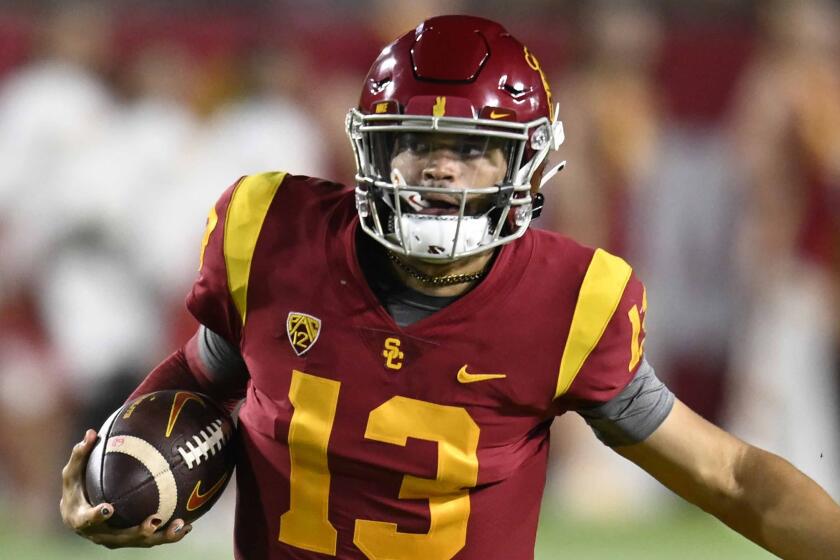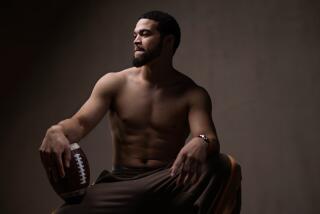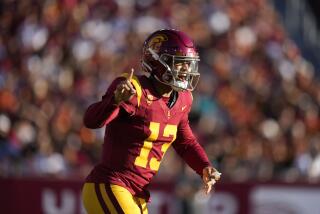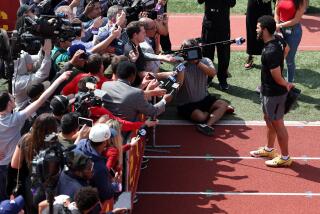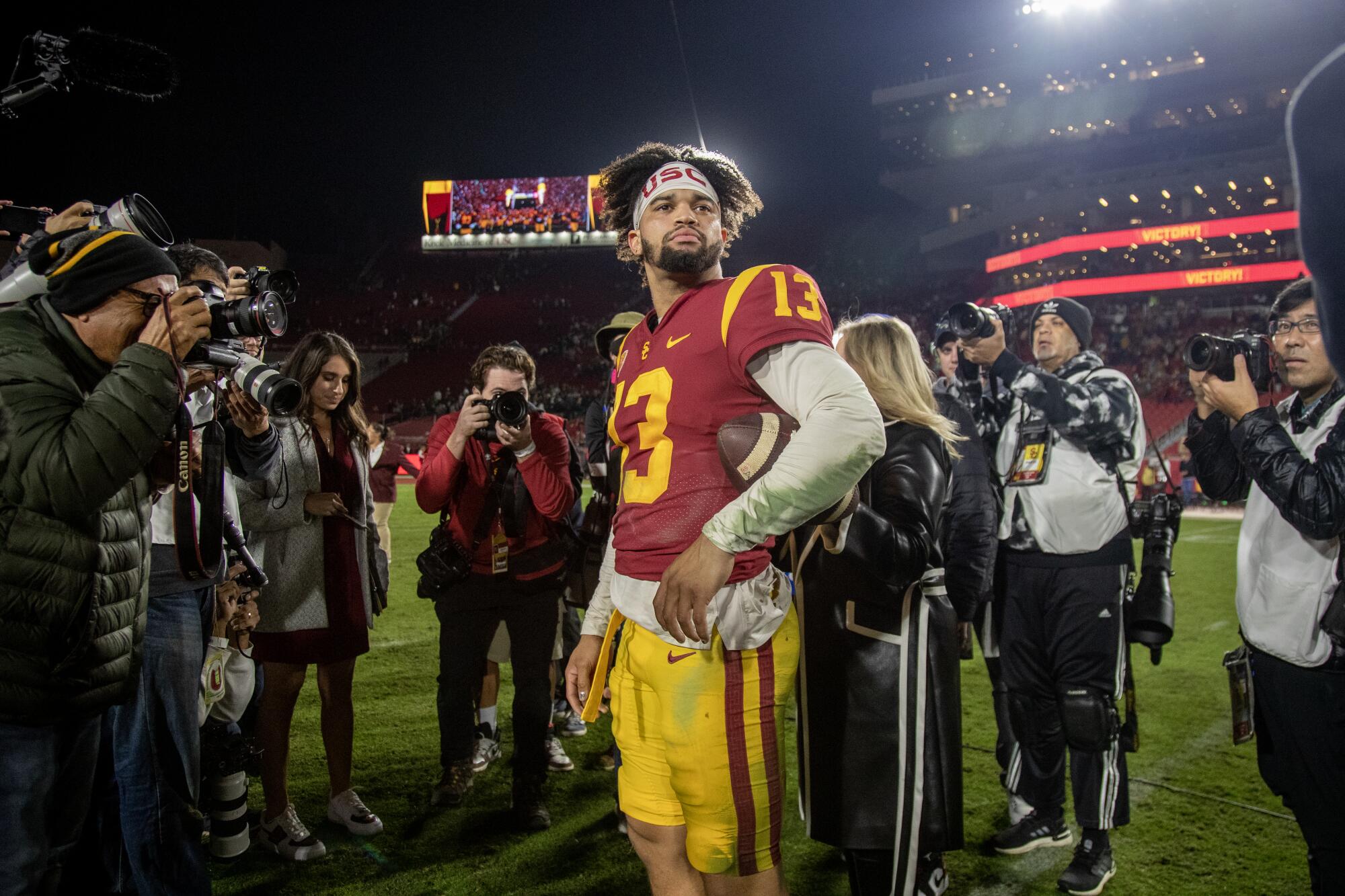
- Share via
As the final seconds ticked away, taking with them any last hope of the College Football Playoff, Caleb Williams looked up at the clock in Las Vegas last Friday, his eyes welling with tears. USC’s quarterback had given everything to that point. He’d carried the Trojans as they climbed rung by rung from 4-8 disaster to 11-1 contender over the past year, dancing and dazzling his way to one of the most dominant seasons the school had ever seen, a campaign so special it’s likely to win him the Heisman Trophy.
But it wasn’t enough. Not tonight, at least. Not while Utah’s pressure bore down and the searing pain in his hamstring sapped him of his usual magic. Williams tried his best to hide the limp, to convince himself and everyone else there was nothing wrong, though deep down he knew there was. He said he tried to channel Kobe Bryant, reciting over and over in his head that the game was bigger than whatever he was feeling.
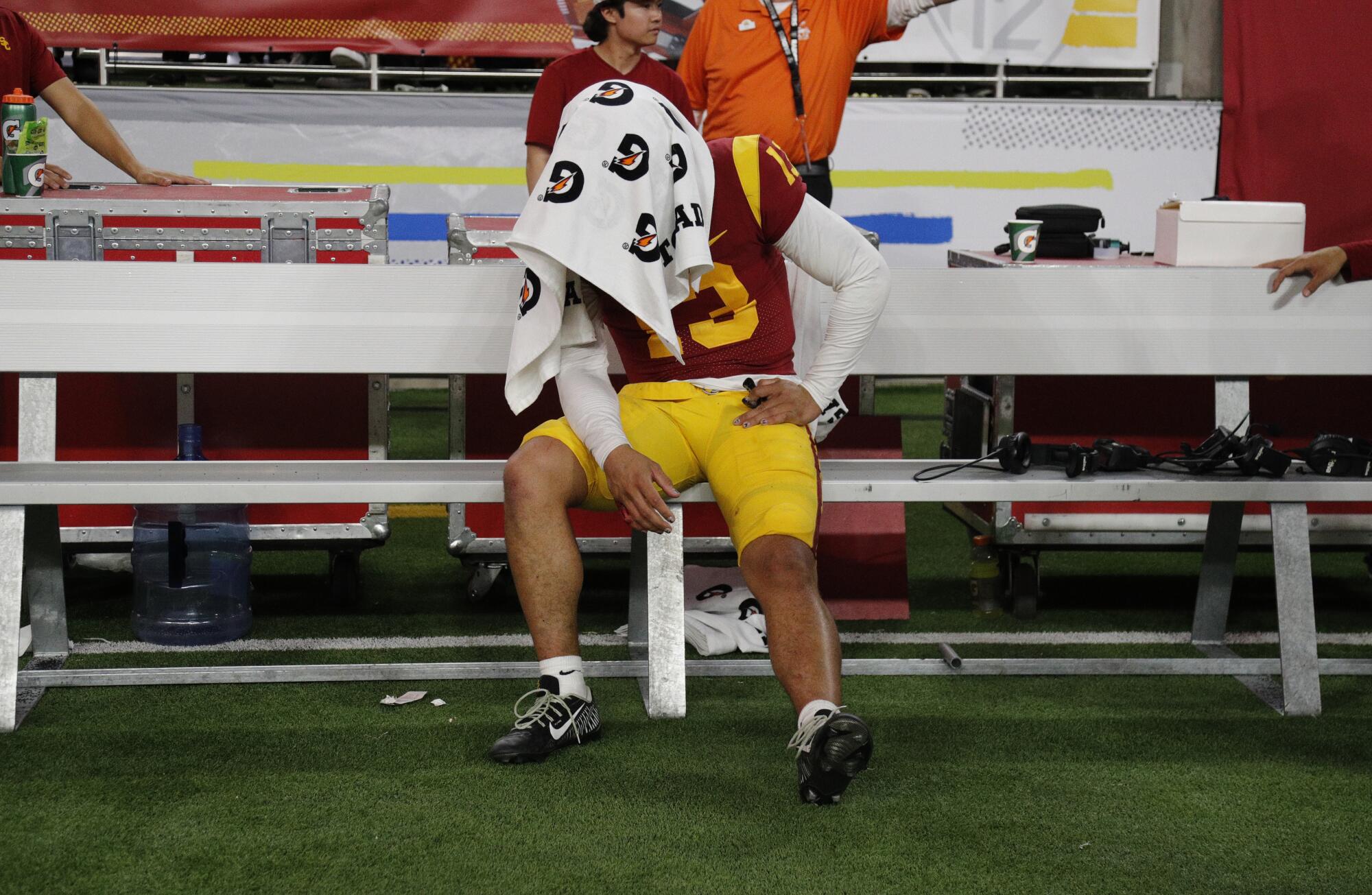
But it was no use. With one minute remaining, Williams stared up at the scoreboard as he hopped to the sideline — 47-24. A season’s worth of feelings swelled to the surface. He thought of all they’d done to get here — and how close they’d come. He thought of center Brett Neilon, who’d just been carted away, his college career now over because of injury. He thought of all the relationships he’d built during the past 10 months after transferring from Oklahoma to USC.
As Utah celebrated its Pac-12 title, Williams plopped down on the bench, a towel draped over his helmet, and the tears came rushing.
“Sometimes,” Williams said later, “there are just moments where there’s 50 seconds on the clock, and you’re down by 20 in a championship game, and you know these guys have worked so hard, and you’ve worked so hard, and you just love this game more than just about anything in this world, and, well — it does affect you.”
Caleb Williams’ run to the Heisman is comparable to Carson Palmer, with him hanging around but not moving into the spotlight until late in the season.
The image of Williams under a towel with tears in his eyes was captured that night by Fox cameras, broadcast for all the world to see. Here was a window into the raw passion that many who know him say drives this year’s presumptive Heisman Trophy favorite.
But soon enough, social media users seized on the moment, distilling it down into 280-character takes, an army of anonymous accounts raising questions about his integrity and lobbing criticism at USC’s quarterback. A flood of Utah fans, unhappy with his explicit fingernail art for the evening, unleashed their own torrent of takes. Even the Utes’ Twitter account piled on with a meme, changing the letters painted on his nails to celebrate back-to-back Pac-12 championships.
The next day, when Texas Christian quarterback and fellow Heisman finalist Max Duggan was lauded for showing similar emotion in defeat, Williams became frustrated and fired off a quote-tweet of one media member’s compliment, tacking on a sarcastic “Lol.” He intended to call attention to what he saw as a “double standard,” but the message was lost. The tweet, Williams said, was misinterpreted — and deleted — but the negative social media cycle had already started anew. “Caleb Williams Appears to Mock TCU QB for Crying After Loss,” one headline read.
“I love that Max showed that he cared,” Williams clarified later. “It truly shows you’re not afraid to express and to feel. … It’s OK to have emotions.”
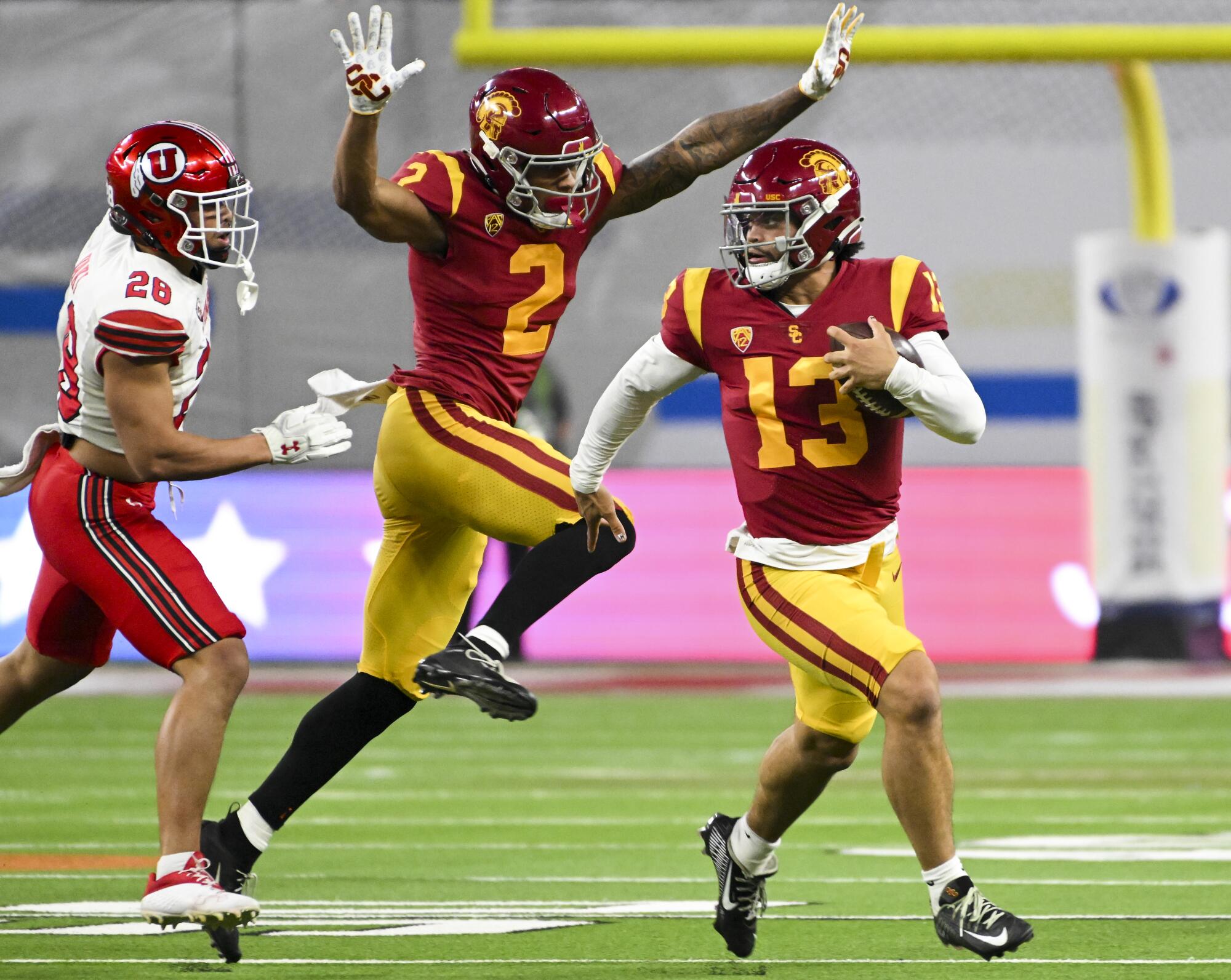
It’s a tightrope the USC quarterback now walks as the new face of a new age of college football. At one moment, he’s “Superman,” impenetrable and poised. The next, he’s opened a vein for all the world to see. It’s a unique balance of bravado and vulnerability that teammates and coaches say has set the star quarterback apart since his days at Gonzaga College High School — and could make him the eighth Heisman winner in USC history.
But the new Trojans star sees no need to tiptoe along any tightropes, confining himself to what others expect a quarterback — or Heisman winner — to become. He’s reminded of the lyrics to a Drake song, one that feels especially poignant just as the spotlight brightens and the world debates what Williams should be.
“He says, ‘Mike never tried to rap like ‘Pac and ‘Pac never tried to rap like Mike,’ ” Williams said. “They’re themselves. They are who they are. I know myself and who I am.
“I’m just trying to be real to me.”
It took all of one summer workout at Gonzaga College High in Washington, D.C., for John Marshall to know that Williams was the real deal. Right away, the junior receiver’s eyes went to the 14-year-old who could uncork a deep ball 50 yards on a rope, a throw that would leave the other quarterbacks in attendance quietly wondering about a position change.
“I saw that one pass, and I was like, ‘Yeah, he’s gonna be the starter,’ ” said Marshall, who’s now a defensive captain at Navy. “I’d never seen arm strength like that from a quarterback.”
No one at Gonzaga blinked when Williams was named the starter of the football powerhouse as a freshman. But talent was one thing. Actually leading an offense at 14 was another.
Caleb Williams’ run to the Heisman is comparable to Carson Palmer, with him hanging around but not moving into the spotlight until late in the season.
The future Heisman favorite wasn’t entirely comfortable playing a vocal role at first, said Danny Schaechter, his former offensive coordinator at Gonzaga. But Schaechter challenged him to practice. Any time the coaches asked for comments, Schaechter told him it was his job to say something.
“He wasn’t really comfortable as a freshman, even as a sophomore, to get up and speak,” Schaechter said. “Not that he was nervous, but he would stumble over words or maybe he wasn’t sure what to say, so he couldn’t start speaking. It was like, the more you practice this, the more you’ll be comfortable doing it.”
He didn’t have to force it. Before long, as the freshman shined on the football field, he became a natural leader.
“He was not a guy to go out of his way to show that he’s in charge,” said Aaron Turner, one of Williams’ high school wideouts who now plays at Connecticut. “He doesn’t have to.”
But Williams had an uncanny ability to make others believe.
“People just gravitated to him,” Gonzaga athletic director Joe Reyna recalls, “even outside of football.”
Certainly no one at Gonzaga, past or present, would ever doubt Williams after his sophomore season and the Hail Mary that etched him into the school’s lore.
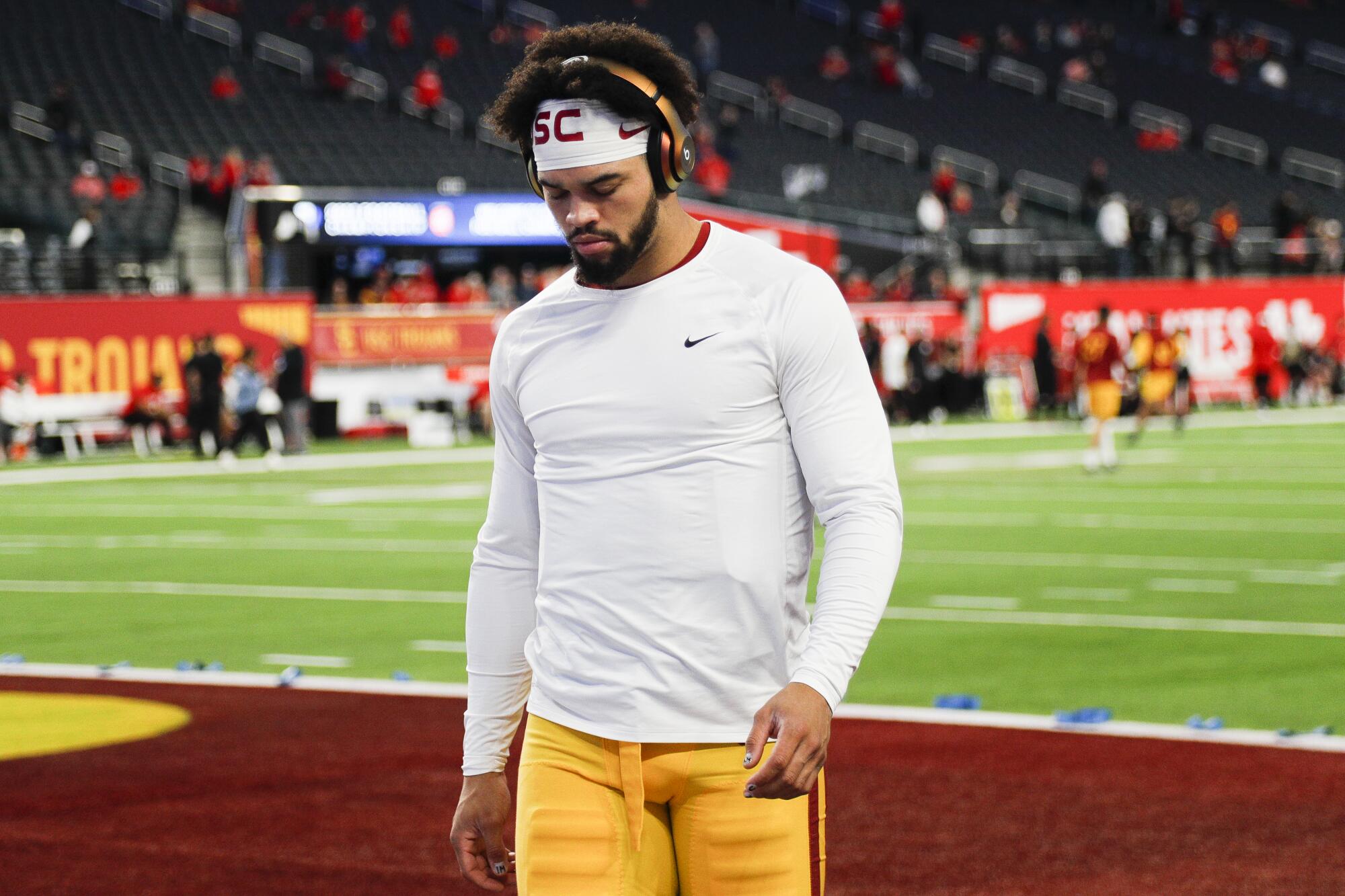
Gonzaga had fallen into a 20-0 hole against potent DeMatha Catholic in the first quarter of the Washington Catholic Athletic Conference championship, the game drawing dangerously close to getting out of hand. But while panic was starting to set in, Williams remained unflinchingly calm.
“I was upset about it,” Marshall said, “and he helped bring me back down.”
Bit by bit, Gonzaga chipped away, buoyed by its quarterback’s belief. At one point, Williams converted a third and 33 to keep a Gonzaga drive alive. A sack in the second half left him limping but undaunted. He fought the rest of the night through an ankle injury that likely would’ve held him out had there been another week of the season.
As Gonzaga coach Randy Trivers tells the story, he can’t help but draw parallels to last Friday’s Pac-12 title loss.
“He held it together,” Trivers said. “That’s one of those times where you could feel the energy I’m talking about, that positivity, that belief, that confidence coming to the forefront. None of this is possible, if he doesn’t have that.”
Williams was calm as he stepped under center with 45 seconds left. He hit Marshall with a deep bomb downfield, then another receiver on a slant for a score, surgically picking apart the defense. Gonzaga took its first lead with less than 30 seconds remaining, before DeMatha returned the ensuing squib kick to regain the lead.
Caleb Williams and his father share the strategies they have used to put the USC quarterback in the best position to win on and off the field.
On the sideline, Schaechter recalls, Williams wiped tears out of his eyes, composing himself for two final plays. He hit one short completion. Then, with time expiring, he heaved a pass 65 yards in the air toward a mess of players in the end zone. The ball whistled through outstretched arms, straight toward Marshall, who could barely believe it as he pulled down the title-winning touchdown.
Williams fell to his knees, sobbing tears of joy.
“The emotion was just pouring out of him,” recalls Jalen McMurray, a former teammate who now plays for Temple. “That’s the passion he brings, and as a teammate of his, you love it. It goes through the whole team.”
The miraculous play announced what most at Gonzaga already knew, deep down: “With that guy,” Turner said, “you’re always gonna have a chance.”
Soon after the rally, teammates started calling him “Superman.”
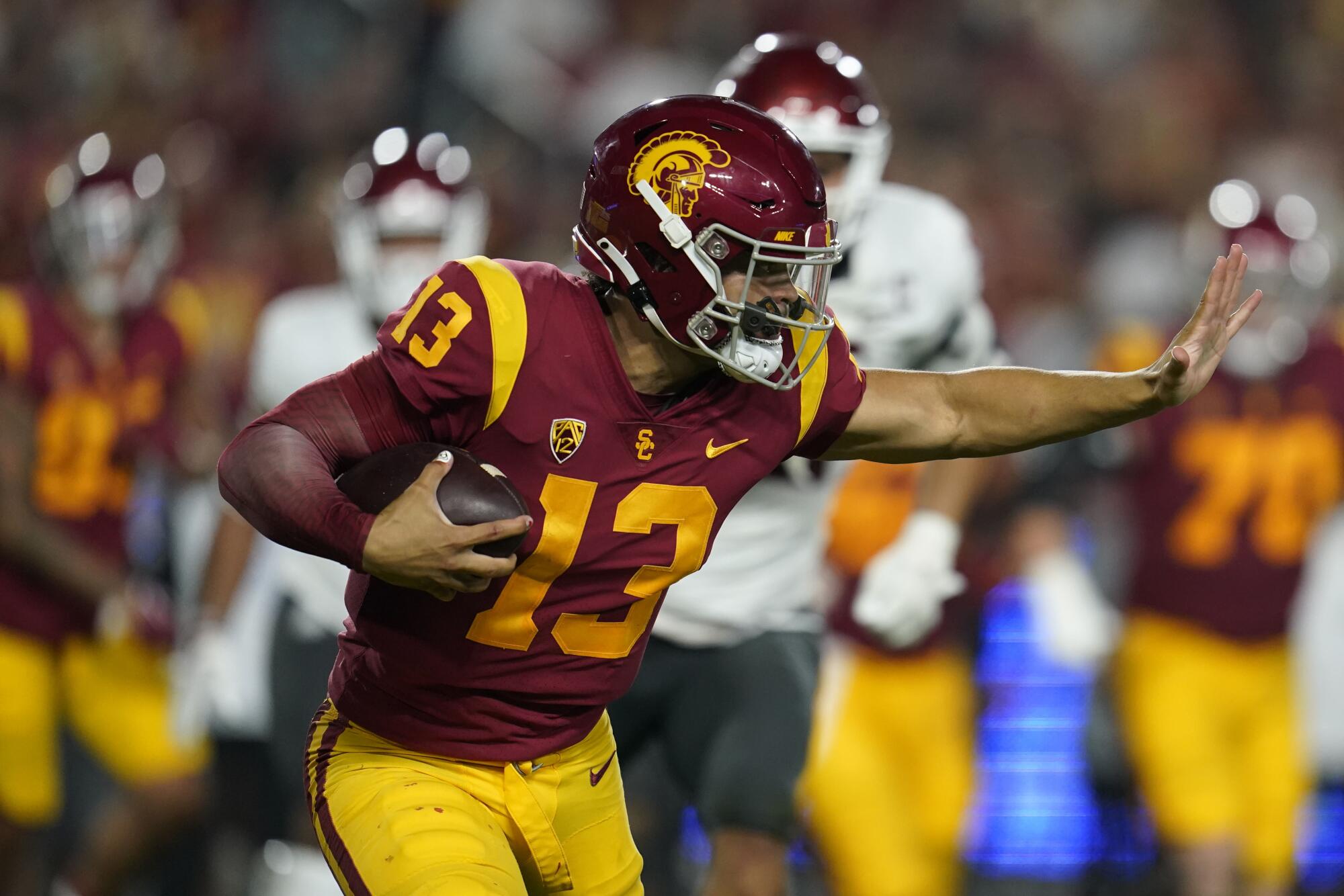
The next season, however, Superman fell short in the playoffs to Our Lady of Good Counsel, Gonzaga’s second loss to the same team that season. Williams was devastated. He promised Schaechter in the locker room after the game they’d come back better.
He’d never get the chance at Gonzaga, as the pandemic canceled his senior season. But the lopsided loss bore a striking resemblance to what Williams faced three years later in Las Vegas, where Utah kept USC out of the College Football Playoff semifinals.
“The beauty of Caleb is when it hurts that deeply,” Schaechter said, “he knows that’s something he can use to get back up — and never let that happen again.”
Less than 48 hours after his hamstring popped and his heart was broken during the Pac-12 title game, Williams limped to the front of a room on USC’s campus filled with kids, each of them watching him closely. He winced as he sat, his left leg splayed to the side, his hamstring still sore, but duty called: A group of students from Audubon Middle School was set to graduate from a college readiness program that his foundation, Caleb Cares, helped organize and he wanted to see them, heartbreak or not.
“I know myself and who I am. I’m just trying to be real to me.”
— USC quarterback Caleb Williams on navigating the spotlight
He was still processing the loss from two nights earlier, still coming to grips with coming up short. There would be time to address the more pertinent questions that have emerged since last weekend — the first of which will be answered Saturday night on a stage in Manhattan. But for now, there were other questions to be answered from eager young onlookers.
Questions like, what was his favorite subject in school? History.
Where is his favorite place he’s traveled? Jamaica, on a family trip.
Williams was happy to answer, well aware of the influence he wields.
“I know I do have a platform,” Williams told the room, “where I can help and reach out to others and others might look up to me.”
Caleb Williams has a reputation for eluding defenders with a level of speed and agility that often leaves his USC teammates in a state of disbelief.
He is collecting recognition this week for a hard-fought regular season, earning Associated Press player of the year honors and the Maxwell Award, which is presented to the most outstanding player in college football.
Williams’ platform is certain to grow Saturday, assuming Williams becomes the first Trojan to hoist the trophy since Reggie Bush in 2005. The pressure to perform is sure to grow with it.
But those who have witnessed his rise know Williams is uniquely qualified to carry that burden. They’ve already seen him do the impossible once.
And after an 11-win campaign, just its second in 14 years, there are no doubts about how much Williams has meant at USC, where such a season would’ve been just as impossible without him.
He will smile in the spotlight and accept individual accolades, but he unquestionably remains unsatisfied after falling far short against Utah.
The tears are dry, but the motivation remains fresh.
More to Read
Go beyond the scoreboard
Get the latest on L.A.'s teams in the daily Sports Report newsletter.
You may occasionally receive promotional content from the Los Angeles Times.

